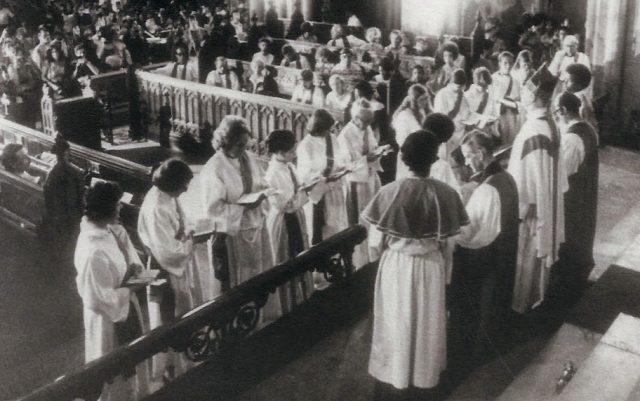
Eleven women were ordained priests at the Church of the Advocate, Philadelphia, on the feast of St. Mary and St. Martha, July 29, 1974, two years before General Convention authorized the ordination of women. The women ordained were Merrill Bittner, Alla Bozarth-Campbell, Alison Cheek, Emily Hewitt, Carter Heyward, Suzanne Hiatt, Marie Moorefield, Jeanette Piccard, Betty Schiess, Katrina Swanson, and Nancy Wittig. The bishops who presided at the service were Daniel Corrigan, Robert DeWitt, and Edward Welles II. These ordinations, and the ordinations of four more women in Sept. 1975 in Washington, D.C., were widely criticized as irregular because the Episcopal Church had not yet authorized the ordination of women to the priesthood. In 1976 the House of Bishops affirmed the validity of the ordinations by requiring of the fifteen women only “an act of completion” that would be “a liturgical incorporation of what was done on those two occasions” in Philadelphia and Washington, D.C.
by Amy Phillips Witzke
Seven-year-old Kristina sat in front of me before the 11 am service recently, wearing her alb. I leaned forward and asked her if she knew that girls at one time were not allowed to be acolytes. She looked puzzled more than shocked. “Why not?” she asked. I really had no answer other than the one that is most beloved by Episcopalians: “Because that’s the way it had always been done.” Our rector’s husband who was sitting nearby then added with a chuckle and a nod to his wife, “And women couldn’t be priests either.”
I was 12 when the rector of my church announced that there would be a class to train new acolytes. To my surprise he did not say the acolytes had to be boys. To this day I do not know whether that was a mistake on his part or whether he was purposely opening the door to girls. I went to the class and became the first female acolyte at the Church of the Holy Comforter, Drexel Hill, Pa. There were audible gasps as I carried the cross down the aisle that first Sunday.
That was in 1974, the same year that the Philadelphia Eleven (as the women came to be known) were ordained as priests in the Episcopal Church. These 11 women had previously been ordained as deacons, but were denied their call to the priesthood solely because they were women. On July 29, the Feast Day of Mary and Martha, the 11 were ordained at the Church of the Advocate, Philadelphia, by three retired Episcopal bishops. The three-hour ordination was punctuated by several priests who stood and read aloud condemnations of the proceedings, but in the end, the ordinations were able to proceed.
I lived in a suburb of Philadelphia at the time. The Philadelphia Eleven were on the front page of the newspaper. My own thoughts centered on how stifling hot it must have been for everyone on that very humid day. My other thoughts were how brave those women were and how happy they must now be. I remember my mother reciting from Psalm 118 with joy, “This is the day that the Lord has made; we will rejoice and be glad in it.”
The Episcopal Church declared the Philadelphia Eleven’s ordinations to be “irregular” but permitted them to stand. It wasn’t until 1976 at General Convention that the House of Bishops and House of Deputies voted to allow women to fully participate in the life of the Church. As Kristina said, “Why not?”
Amy Phillips Witzke attends St. Timothy’s Episcopal Church, Mountain View, Ca. She served as an acolyte from sixth grade through high school and always remembered that when lighting the altar candles, the Gospel candle never stands alone.

